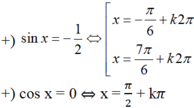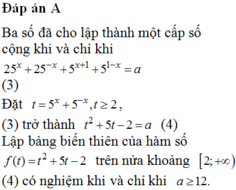Với giá trị nào của a, ta có thể tìm được các giá trị của x để các số : \(5^{x+1}+5^{1-x}.\frac{a}{2},25^x+25^{-x}\), lập thành một cấp số cộng ?
Hãy nhập câu hỏi của bạn vào đây, nếu là tài khoản VIP, bạn sẽ được ưu tiên trả lời.


Chọn A.
Theo tính chất của cấp số cộng ta có:
1+ sin x + 1 + sin 3x = 2sin2x
⇔ 2 + 4sin x – 4sin3 x = 2sin2x
⇔ 2sin3x + sin2x – 2sin x – 1 = 0
⇔ (2sin x + 1)(sin2x – 1) = 0


Với nghiệm  và x ∈ [0;2π], ta tìm được
và x ∈ [0;2π], ta tìm được  .
.
Với nghiệm  và x ∈ [0;2π], ta tìm được
và x ∈ [0;2π], ta tìm được  .
.
Với nghiệm ![]() và x ∈ [0;2π] ta tìm được nghiệm
và x ∈ [0;2π] ta tìm được nghiệm 
Do đó 

a) ĐKXĐ: \(x\notin\left\{5;-5\right\}\)
b) Ta có: \(A=\dfrac{2x}{x^2-25}+\dfrac{5}{5-x}-\dfrac{1}{x+5}\)
\(=\dfrac{2x}{\left(x-5\right)\left(x+5\right)}-\dfrac{5}{x-5}-\dfrac{1}{x+5}\)
\(=\dfrac{2x}{\left(x-5\right)\left(x+5\right)}-\dfrac{5\left(x+5\right)}{\left(x-5\right)\left(x+5\right)}-\dfrac{x-5}{\left(x+5\right)\left(x-5\right)}\)
\(=\dfrac{2x-5x-25-x+5}{\left(x-5\right)\left(x+5\right)}\)
\(=\dfrac{-4x-20}{\left(x-5\right)\left(x+5\right)}\)
\(=\dfrac{-4\left(x+5\right)}{\left(x-5\right)\left(x+5\right)}\)
\(=\dfrac{-4}{x-5}\)
Để A nguyên thì \(-4⋮x-5\)
\(\Leftrightarrow x-5\inƯ\left(-4\right)\)
\(\Leftrightarrow x-5\in\left\{1;-1;2;-2;4;-4\right\}\)
hay \(x\in\left\{6;4;7;3;9;1\right\}\)(nhận)
Vậy: Để A nguyên thì \(x\in\left\{6;4;7;3;9;1\right\}\)

Chọn A
Theo giả thiết ta có :
y = x q ; z = x q 2 x + 3 z = 2 2 y ⇒ x + 3 x q 2 = 4 x q ⇒ x 3 q 2 − 4 q + 1 = 0 ⇔ x = 0 3 q 2 − 4 q + 1 = 0 .
Nếu x = 0 ⇒ y = z = 0 ⇒ công sai của cấp số cộng: x ; 2y ; 3z bằng 0 (vô lí).
nếu
3 q 2 − 4 q + 1 = 0 ⇔ q = 1 q = 1 3 ⇔ q = 1 3 q = 1 .

a) x4+x3+2x2+x+1=(x4+x3+x2)+(x2+x+1)=x2(x2+x+1)+(x2+x+1)=(x2+x+1)(x2+1)
b)a3+b3+c3-3abc=a3+3ab(a+b)+b3+c3 -(3ab(a+b)+3abc)=(a+b)3+c3-3ab(a+b+c)
=(a+b+c)((a+b)2-(a+b)c+c2)-3ab(a+b+c)=(a+b+c)(a2+2ab+b2-ac-ab+c2-3ab)=(a+b+c)(a2+b2+c2-ab-ac-bc)
c)Đặt x-y=a;y-z=b;z-x=c
a+b+c=x-y-z+z-x=o
đưa về như bài b
d)nhóm 2 hạng tử đầu lại và 2hangj tử sau lại để 2 hạng tử sau ở trong ngoặc sau đó áp dụng hằng đẳng thức dề tính sau đó dặt nhân tử chung
e)x2(y-z)+y2(z-x)+z2(x-y)=x2(y-z)-y2((y-z)+(x-y))+z2(x-y)
=x2(y-z)-y2(y-z)-y2(x-y)+z2(x-y)=(y-z)(x2-y2)-(x-y)(y2-z2)=(y-z)(x2-2y2+xy+xz+yz)

a, ĐKXĐ: \(\hept{\begin{cases}5x+25\ne0\\x\ne0\\x^2+5x\ne0\end{cases}\Rightarrow\hept{\begin{cases}5\left(x+5\right)\ne0\\x\ne0\\x\left(x+5\right)\ne0\end{cases}\Rightarrow}}\hept{\begin{cases}x\ne0\\x\ne-5\end{cases}}\)
b, \(P=\frac{x^2}{5x+25}+\frac{2x-10}{x}+\frac{50+5x}{x^2+5x}\)
\(=\frac{x^3}{5x\left(x+5\right)}+\frac{5\left(2x-10\right)\left(x+5\right)}{5x\left(x+5\right)}+\frac{\left(50+5x\right).5}{5x\left(x+5\right)}\)
\(=\frac{x^3+10\left(x-5\right)\left(x+5\right)+250+25x}{5x\left(x+5\right)}\)
\(=\frac{x^3+10x^2+25x}{5x\left(x+5\right)}=\frac{x\left(x+5\right)^2}{5x\left(x+5\right)}=\frac{x+5}{5}\)
c, \(P=-4\Rightarrow\frac{x+5}{5}=-4\Rightarrow x+5=-20\Rightarrow x=-25\)
d, \(\frac{1}{P}\in Z\Rightarrow\frac{5}{x+5}\in Z\Rightarrow5⋮\left(x+5\right)\Rightarrow x+5\inƯ\left(5\right)=\left\{-5;-1;1;5\right\}\Rightarrow x\in\left\{-10;-6;-4;0\right\}\)
Mà x khác 0 (ĐKXĐ của P) nên \(x\in\left\{-10;-6;-4\right\}\)
a) \(ĐKXĐ:\hept{\begin{cases}5x+25\ne0\\x\ne0\\x^2+5x\ne0\end{cases}}\Leftrightarrow\hept{\begin{cases}x\ne0\\x\ne-5\end{cases}}\)
b) \(P=\frac{x^2}{5x+25}+\frac{2x-10}{x}+\frac{50+5x}{x^2+5x}\)
\(P=\frac{x^3}{5x\left(x+5\right)}+\frac{10x^2-250}{5x\left(x+5\right)}+\frac{250+25x}{5x\left(x+5\right)}\)
\(P=\frac{x^3+10x^2+25x}{5x\left(x+5\right)}=\frac{x\left(x+5\right)^2}{5x\left(x+5\right)}=\frac{x+5}{5}\)
c) \(P=4\Leftrightarrow\frac{x+5}{5}=4\Leftrightarrow x+5=20\Leftrightarrow x=15\)
d) \(\frac{1}{P}=\frac{5}{x+5}\in Z\Leftrightarrow5⋮x+5\)
\(\Leftrightarrow x+5\inƯ\left(5\right)=\left\{\pm1;\pm5\right\}\)
Lập bảng nhé
e) \(Q=P+\frac{x+25}{x+5}=\frac{x+30}{x+5}=1+\frac{25}{x+5}\)
\(Q_{min}\Leftrightarrow\frac{25}{x+5}_{min}\)

ta thấy rằng 5 phải chia hết cho a tức là
a(U)5=1,-1;5,-5
vậy a 1,-1,5,-5 thì x có giá trị nguyên


Để 3 số hạng đó lập thành cấp số cộng, ta có :
\(\left(5^{1+x}+5^{1-x}\right)+\left(25^x+25^{-x}\right)=2\left(\frac{a}{2}\right)\)
\(\Leftrightarrow a=5\left(5^x+\frac{1}{5^x}\right)+\left(5^{2x}+\frac{1}{5^{2x}}\right)\)
Theo bất đẳng thức côsi, ta có : \(5^x+\frac{1}{5^x}\ge2\sqrt{1}=2,5^{2x}+\frac{1}{5^{2x}}\ge2\)
\(\Rightarrow a\ge5.2+2=12\)
Vậy với : \(a\ge12\), thì 3 số đó lập thành cấp số cộng.